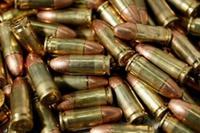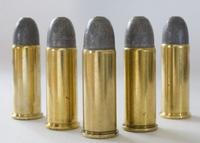-
The two sides in the gun control debate are gearing up for Round 2
A few weeks ago, when the Senate was considering legislation to expand background checks for gun buyers and other gun-control measures, gun-rights advocate successfully organized and campaigned at the grass-root level, exerting pressure on enough wavering Senators, including four Democrats from Red stated who face re-election in 2014. Now, as the Senate majority leader is getting set to introduce the gun-control measures again, supporters of gun control legislation are trying to emulate the grass-root mobilization performance of gun-rights advocates.
-
-
Privacy, cost concerns check drive for more surveillance cameras

Law enforcement agencies in cities across the United States are campaigning to increase surveillance on city streets, impressed with the effectiveness of video surveillance in helping the Boston Police identify the two suspects in the Boston Marathon bombings. This campaign to expand law enforcement’s surveillance power is likely to run into stiff opposition, as Americans have proven suspicious of allowing the government powers which would infringe on privacy. Expanding surveillance networks also costs money, and these are tight budgetary times.
-
-
Texas becomes gun-friendlier
Texas is already considered one of the most gun-friendly states in the nation, and on Saturday it became even more so when the State House passed twelve different gun bill which would make it easier to own and carry guns in the state. Some of the bills – for example, the one which would punish police officers or government officials by up to a year in jail and a $4,000 fine if they attempt to enforce federal firearms limits in Texas – may be found to be unconstitutional.
-
-
Iowa sex offenders allowed to keep guns
A law enacted two years ago has made it possible for more than fifty sex offenders in Iowa to apply for gun permits. Sheriffs and some lawmakers are uncomfortable with the situation, but advocates for sex offender rehabilitation say such offenders are not necessarily dangerous criminals.
-
-
Hollow point ammunition is more effective and safer to use

While there is a legitimate concern about the number of rounds purchased by DHS, there should be no questions about the department’s decision to purchase hollow point rounds. Hollow point rounds do not explode on impact, but rather expand on contact. They are less likely to penetrate completely through a body and strike innocent bystanders. Hollow point rounds are standard ammunition of law enforcement agencies in the United States.
-
-
Woman who killed N.J. trooper in 1973 makes the FBI’s most wanted list
Joanne Chesimard, a former member of the Black Liberation Army who killed a New Jersey state trooper in 1973, has become the first woman to make the FBI’s most wanted list. The reward for her capture and arrest has doubled to $2 million. In 1979 Chesimard escaped jail, and since 1984 has been living in Cuba, using the name Assata Shakur.
-
-
Delaware develops comprehensive schools safety program
Delaware has become the first state to develop a comprehensive school safety model which includes a central portal for school safety plans. A Web-based portal to serve as a repository for all public school safety plans in the state will be developed, and will become accessible to school safety teams in time for the new school year this fall.
-
-
Three of Dzhokhar’s friends charged with destroying evidence (Updated)

Three college students have been arrested on suspicion that they helped Dzhokhar Tsarnaev destroy evidence which would have provided details about his and his brother’s preparations for the marathon bombing. One of the three then lied to police when asked about their actions. The three are likely to face charges of conspiracy to obstruct justice. One of three will also be charged with lying to federal investigators.
-
-
GAO investigates DHS ammo purchases

DHS is again facing questions about the department’s large ammunition purchases, at the same time that a bill is being introduced which would limit the amount of ammo a government agency can legally buy.
-
-
Female DNA found on Boston bomb fragments
FBI investigators found female DNA on fragments from the bombs used in the Marathon attack. The finding was first reported in the Wall Street Journal. Mikhail Allakhrdov, a man who some of Tsarnaev’s family members and friends described as the mysterious “Misha” who radicalized Tamerlan, said that he had not been in contact with Tsarnaev for several years, and that he never encouraged him to take up violence. Allakhrdov, a Ukrainian Christian who converted to Islam, admitted that a few years ago he was Tsarnaev’s “spiritual tutor.”
-
-
Assessing security at schools, houses of worship
The Office of Infrastructure Protection of DHS National Protection and Programs Directorate will be conducting a virtual roundtable on the topic of “Conducting Security Assessments: A Guide for Schools and Houses of Worship.”
-
-
California considering lead ammo ban

Health and environmental advocates are trying to make California the first state to enforce a statewide ban on the use of lead bullets for hunting. The U.S. Geological Survey (USGS) estimates that there are 400,000 pieces of lead shot per acre in wild game territory which can be eaten or washed into rivers and waterways. The USGS also says that 60,000 metric tons of lead fired off last year is the second largest use of lead in the United States behind batteries. The CDC reports that lead is so abundant in meat harvested through hunting, that pregnant woman and children should never eat it. The NRA opposes the ban, saying it could possibly the end of hunting in California.
-
-
FBI looking for a “person of interest” who may have helped the Tsanaev brothers
Lawmakers with knowledge of the investigation into the Boston marathon bombing said over the weekend that law enforcement agencies are looking for a “person of interest” who may have been involved with the Tsarnaev brothers in preparing the attack. The lawmakers highlighted the fact that law enforcement agencies are not convinced that the brothers acted alone, without any help of one or two more people.
-
-
Lawmakers renew effort to reach bipartisan gun control compromise
Lawmakers have quietly begun discussions over gun control measures, with a bi-partisan group of senators trying to come up with a compromise to solve the differences that led to the failure two weeks ago of a comprehensive overhaul effort.
-
-
Jewish Security Summit discusses communal safety
Leaders from the Jewish Federations of North America (JFNA) and other Jewish organizations gathered last week at the first Jewish Communal Security Summit in New York to strategize with top experts in the field how best to keep the community safe.Security providers from around the country had a chance to learn about best practices in threat assessment and response in the current climate.
-
More headlines
The long view
How Male Grievance Fuels Radicalization and Extremist Violence
Social extremism is evolving in reach and form. While traditional racial supremacy ideologies remain, contemporary movements are now often fueled by something more personal and emotionally resonant: male grievance.
